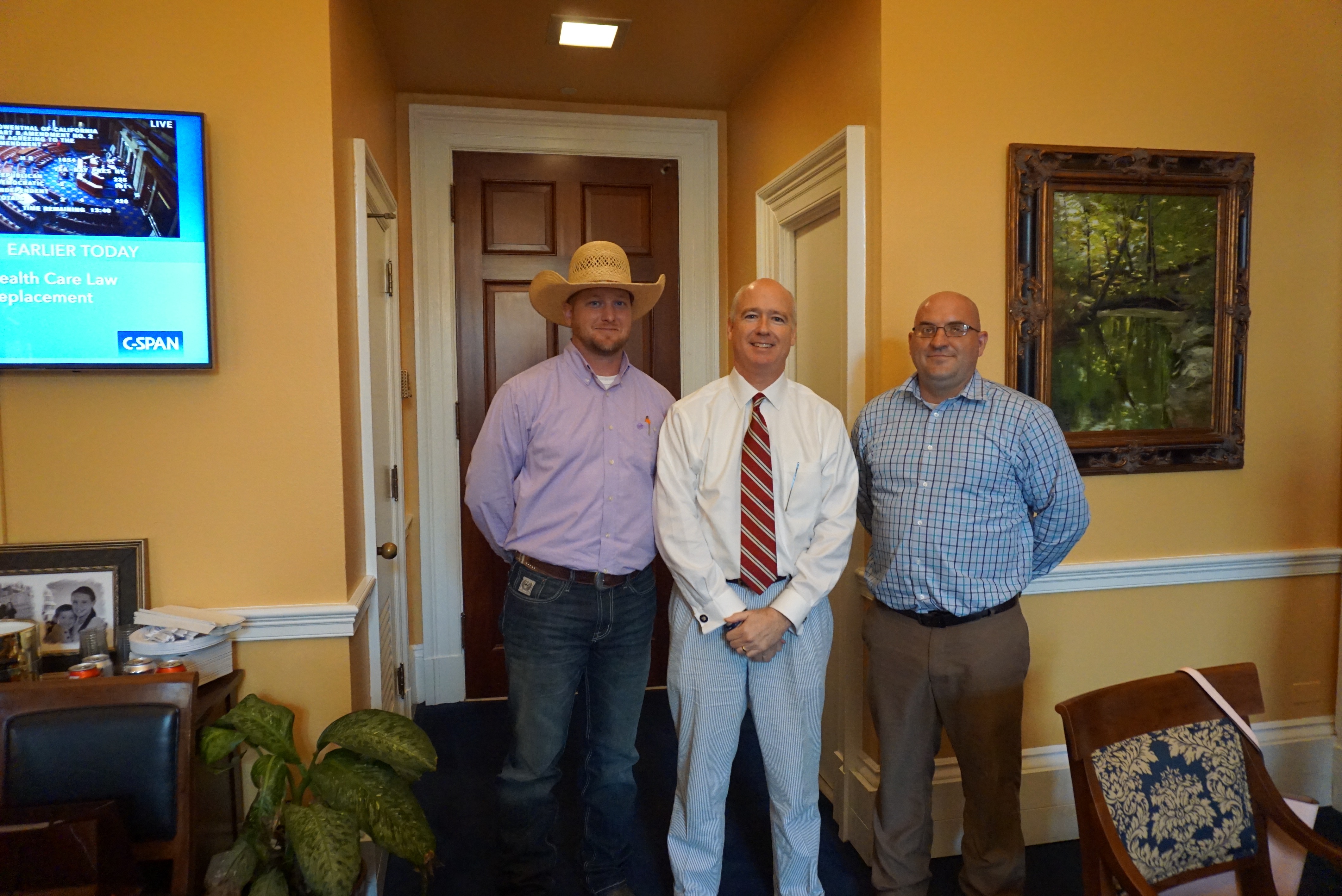Cullman County farmers Cody Rasco, left and Gregg DeBoer, right, met with Rep. Robert Aderholt, R-Alabama in Washington, D.C. last week. / NSAC
WASHINGTON, D.C. – Last week, the National Sustainable Agriculture Coalition (NSAC) hosted its second “farmer fly-in” of the fiscal year (FY) 2018 season. Growers and advocates from Oregon, Mississippi, North Dakota, Wisconsin, Kansas, Iowa, Florida, Alabama and Georgia took time out of their busy schedules to bring important food and farm issues to legislators’ attention as the FY 2018 appropriations cycle heats up.
On Wednesday, June 21 Cody Rasco and Gregg DeBoer, farmers, friends and neighbors from north-central Alabama, came to the capital to meet with Rep. Robert Aderholt, R-Alabama and with the office of Sen. Luther Strange, R-Alabama. Rasco and DeBoer, a family farmer who attended an NSAC fly-in last March and returned this year to assist his neighbor, shared their stories and discussed the importance of the U.S. Department of Agriculture’s (USDA) Environmental Quality Incentives Program (EQIP) with the congressmen. DeBoer and Rasco also met with officials from the Office of Management and Budget (OMB) to discuss funding for this program.
“It is the farmers’ stories that are the most critical to explaining the importance of U.S. Department of Agriculture programs to Congress,” said Greg Fogel, NSAC policy director. “These are the folks that are actually using the programs every day, and they are the ones that will be most impacted by the legislative and appropriation decisions made here in DC.”
Rasco is a young farmer who operates his 500-acre operation, Rasco Cattle Ranch, with his wife. The farm supports just under 100 head of cattle and also sells hay to the public. Last year, Rasco and his neighbors ran into a rough patch when their area was struck with a severe drought.
“Ponds and creeks that had been there for 60-100 years totally dried up,” said Rasco.
The struggle of having to haul water out to the cows every day and not being able to find enough high-quality water and hay to feed his animals led Rasco to apply for his first EQIP grant this year. Rasco applied to install an automatic watering system and to implement rotational grazing on his land. Both of these practices allow farmers to better manage their land during times of drought. Rotational grazing reduces stress on drought pastures, and automatic waterers ensure a steady supply of water for animals. Rasco is currently waiting to hear back regarding the status of his grant application.
“Ninety percent of farms in the U.S. are small farms, the average age of farmers is about 60, they retire and no one is there to take it over,” said Rasco. “I always hear at meetings about people who want to start farming but they don’t have the support they need to do it. Programs like EQIP can provide that support, but if they are cut or eliminated, there will be even fewer avenues for younger farmers like me to establish themselves and start farming. Conservation programs can help farmers properly manage their land so that it can be passed on to the next generation.”
Rasco is a member of the Cullman County Young Farmers Organization, and is passionate about encouraging and supporting his fellow young farmers. Spreading the word about programs like EQIP and how it can help farmers improve their operations is a big part of that effort.
EQIP provides financial cost-share assistance and technical assistance to implement conservation practices and represents one of two programs (the other being the Conservation Stewardship Program) at the heart of America’s sustainable agriculture programming. Even though producer demand for EQIP already far outstrips available dollars, the President’s FY 2018 budget proposal suggests cuts of $325 million to the program. NSAC and Rasco are urging Congress to maintain the current levels of mandatory funding for this critical program. If the EQIP budget is further reduced, it will be extremely unlikely that the program will be able to help farmers like Cody, who are trying to make their operations more resilient to extreme weather.
“I had a great experience today, I mostly talked about the advantages of EQIP, especially the advantages it has for young and beginning farmers,” said Rasco. “If you want your voice heard you need to do this continuously, you can’t just come out here and spill your beans and go home and expect a change, you have to keep at it, keep coming back.”



















